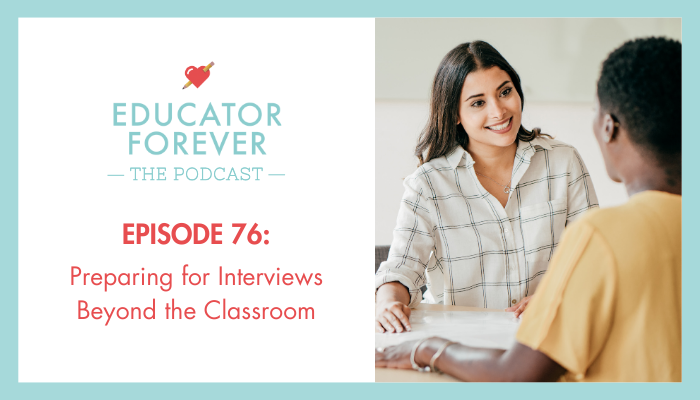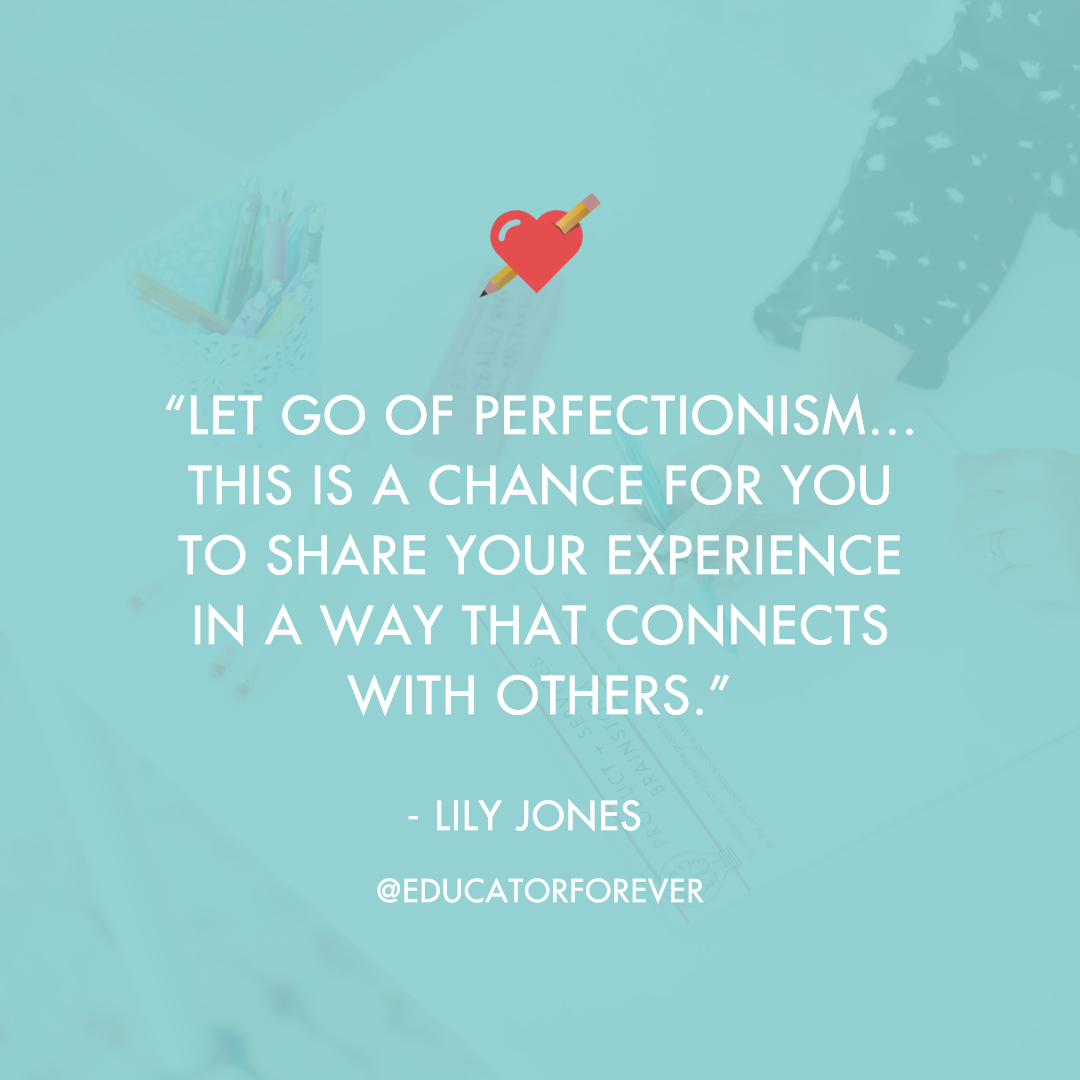Episode 76: Preparing for Interviews Beyond the Classroom
When you're looking for jobs beyond the classroom, it is super exciting when you get your first interview, or really any interview. An interview gives you a chance to really explain your expertise and explain your experience and connect with the people at the organization where you're hoping to work.
I know that interviews can also be slightly terrifying though, especially if you haven't been on an interview in many years or if you've only been on interviews for district teaching jobs or school jobs. In those cases, interviews for flexible work beyond the classroom are probably going to look different. And that's okay. We just need to think through how we're going to prepare before, during, and after the interview to set you up for success. In this podcast, I'm going to walk you through exactly how to prepare for an interview when going for work beyond the classroom.
If you’re interested in joining our Network, click here!
Topics Discussed:
Preparation is more than reading
The importance of confidence
Trying to enjoy the process
Resources mentioned:
Take our FREE quiz to nail down your next best career step in education.
If you’re enjoying this podcast, please leave a rating and review on Apple Podcasts.
Related episodes and blog posts:
Read the transcript for this episode:
Welcome to Educator Forever, where we empower teachers to innovate education. Join us each week to hear stories of teachers expanding their impacts beyond the classroom and explore ways to reimagine teaching and learning.
When you're looking for jobs beyond the classroom, it is super exciting when you get your first interview, or really any interview. An interview gives you a chance to really explain your expertise and explain your experience and connect with the people at the organization where you're hoping to work. I know that interviews can also be slightly terrifying though, especially if you haven't been on an interview in many years or if you've only been on interviews for district teaching jobs or school jobs. In those cases, interviews for flexible work beyond the classroom are probably going to look differently. And that's okay. We just need to think through how we're going to prepare before, during and after the interview to set you up for success. And so in this podcast, I'm going to walk you through exactly how to prepare for an interview when going for work beyond the classroom.
First, we're going to think about what to do before the interview, it really is important to take time to prepare for the interview. This will not only set you up for success, but it will also help you to calm your nerves. The more prepared you are, the more prepared you'll feel. And throughout it all remember that you're also interviewing the company or organization. Interviews can feel very lopsided, like they're gonna just interrogate me and then make a decision about whether I can join their team. No, you're also making a decision if you want to join their team. So use this as a true authentic chance to really interview the people at the organization that you're applying to get a sense of what it would be like to work with them and really get your questions answered.
So before the interview, I have four tips for you before the interview, and these all take time. The first one is taking the time to research the company or organization. This doesn't have to be super intensive. But go on to their website, learn a little bit about what they offer. Write down your questions. Think about how your experience connects, have some sense of how the company or organization runs, and what they are offering. With that sense in mind with what you've learned from really investigating the company or organization, get clear on your relevant skills.
My second tip before the interview is to know these skills and to be able to talk about them. So if you see oh, wow, this company is developing social and emotional learning curriculum. And I've developed social and emotional learning curriculum for my classroom, I would write down some notes about what that curriculum looked like, how I developed it, and what skills I developed within myself through that process.
My third tip for before the interview is to boost your confidence. This actually comes from knowing your relevant skills, right? When you really think about huh, I've done similar things before you're able to boost your competence. But this also comes in right before an interview, you can think about for you What are activities that you could do to really boost your competence. This could be talking to a friend or a loved one. This could be reading notes from former students that tell you how awesome you are, it could be reading an evaluation that you've gotten that was really positive or pointed out some of your strengths. This could also be listening to your favorite song and dancing, you know, do whatever will get you into that confident energy, which also goes along with number four, which is to calm your nerves right before the interview. This could be lighting a candle, listening to a song, meditating, taking deep breaths, having a snack like whatever gets you into your calmest energy. So before the interview, to recap, my four tips are to take the time to research the company or organization, know your relevant skills, boost your competence and calm your nerves right before the interview. And I would say calm your nerves don't feel like you have to totally extinguish all your nerves like it's normal and totally fine to feel a little nervous.
And then during the interview, I have four tips for you there as well. The first one is to take the pressure off yourself, but claim your power. And by this I mean that I want you to know that you don't have to know all the answers. But you can have the confidence that even if you don't know an answer right away, you'll be able to come up with an answer and you're gonna do your best. Let go of perfectionism. This is not a multiple choice test. This is a chance for you to share your experience in a way that connects with others. And again, remember that you are also interviewing the organization. So really claim your power. You get to participate in this genuine connection activity.
Second tip for during the interview is to approach the interviewer as your most confident self. But embrace imperfection. This really goes along with all that I just said, come into your competence, know that you have a wealth of experience from being in the classroom, and that you don't have to be perfect, you are going to try and communicate to how your experience connects to what this company or organization once, and you're gonna let go of perfectionism.
And then during the interview, my third tip is to truly enjoy the conversation, find it fun, find it as a nice way to connect with other like minded people. And if you don't find it fun, or it seems really uncomfortable, or you don't connect with the people, that's what I mean by interviewing them. You might not want to work there, if you really don't connect with the people. So go into it with inquiry with curiosity as a chance to really connect with other people.
And then my fourth tip for during the interview is to consider referring to a cheat sheet. If your interview is virtual. The great thing about virtual interviews is you can have a post it with some notes about your skills, or your relevant experience or your questions that you want to refer to. So don't be afraid to refer to it. And don't be afraid to take some think time within your interview as well. You can always take a pause, rephrase the question, ask follow up questions. You don't have to know things right away, you can refer to those cheat sheets and take your time.
And then after the interview, I have four tips here as well. The first one is to celebrate the accomplishment of completing the interview. This is huge going on an interview likely feels out of your comfort zone. And so celebrate that you took the action, you went on the interview, you learned through the process and whether you get the job or not. That is cause for celebration. And that actually is learning that will bring you closer to your goals. Along with that learning is my second tip that you should take the time to reflect on your experience and jot down notes. So this could be writing down some questions that you got. So you remember for next time, oh, maybe I'll get these questions. Again. This could be writing down some anecdotes that you told that seemed to resonate with people, or some things that you said that maybe you didn't communicate so well and that you want to work on. That's okay. We all have anecdotes or parts of our experience that we need to workshop through interviews through talking to people about them. So write down what you want to work on so that you can improve going forward. My third tip is to have a growth mindset. You don't have to have a perfect interview, nobody has a perfect interview. But you do need to approach it with a growth mindset as a chance to learn and grow through the process. And along with that, my final tip is to think of each interview as another step in the journey rather than the final destination.
So again, after the interview, really celebrating the accomplishment of completing the interview, taking time to reflect on your experience and jot down notes. Remember to have a growth mindset and think of each interview as another step in the journey rather than the final destination. Really embrace learning through the process. An interview is a chance for you to get clear on how to tell your story, and how to tell your story in a way that resonates with others. It's also a chance for you to network. And even if you don't get the job that you're applying for, you will have made those connections. And so treat your interview this way you're authentically building a connection with another person who's likely doing great work in education. And even if you're not hired for this particular job, this connection could prove really valuable and fulfilling. So nurture that relationship. Go and do it with curiosity. Have fun, take the pressure off and really see this as a step in your journey to get where you want to be.
If you want more support, preparing for interviews, or going beyond the classroom and landing those jobs, we would love to have you try out the educator forever network where we support you with all of these things, and a community of truly amazing educators. So I'll put the link to that down below in the show notes. But you can also go to learn that educator forever.com/network To learn more about our awesome community. And I hope you have fun through the process of reflecting on what you've learned as an educator and applying for jobs. Taking that joy and curiosity forward is really what's gonna land you those interviews and land you those jobs.
Transcribed by https://otter.ai


